Blade Runner Oscar Pistorius: A look back at the Olympian’s meteoric rise and fall
Former South African track star Oscar Pistorius could be released as early as this year for the 2013 slaying of model Reeva Steenkamp in a case that captured international attention.
The double amputee, 35, was sentenced to 13 years and five months after he was convicted of murdering the TV reality star in the early morning hours of Valentine’s Day.
The Olympic athlete, who earned the nickname Blade Runner for the futuristic carbon-fiber prosthetics he used for competitions, met face-to-face with Steenkamp’s father for the first time on June 22 as part of his parole bid.
The disabled athlete, the first to compete against able-bodied men, was once hailed as the most inspirational figure in sports.
‘BLADE RUNNER’ PISTORIUS CHARGED WITH MURDER AFTER GIRLFRIEND SHOT TO DEATH IN HOME
But that image was shattered when he fired four shots into a bathroom stall in his Pretoria home in an upscale gated community, killing 27-year-old Steenkamp, his girlfriend of three months.
He claimed he mistook her for an intruder — but prosecutors argued that the two had an argument, and he fired out of anger.
Who is Oscar Pistorius?
Pistorius was born in Johannesburg, South Africa, with a congenital abnormality that left him without a fibula bone in either of his lower legs.
His legs were amputated below the knee when he was 11 months old — but his mother taught him that his disability was not an excuse and pushed him to participate in sports.
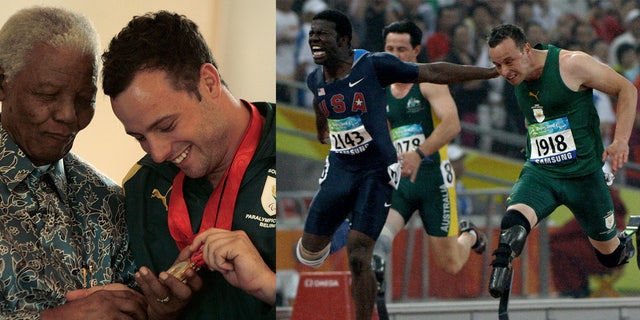
After obtaining his first carbon-fiber prosthetics, Pistorius competed in the 2004 Paralympic Games in Athens and won gold in the 200 meters. He soon became the world’s most famous disabled athlete.
At the 2008 Paralympics, Pistorius won gold in the 100, 200 and 400 meters, setting world records in all three categories.
He also began competing against non-disabled athletes, but many critics complained that his carbon-fiber blades gave him an unfair advantage.

At the pinnacle of Pistorius’ career, he competed at the 2012 London Olympics, becoming the first amputee to race in an Olympic track event, and he was chosen to carry South Arica’s flag at the closing ceremony.
The accomplishment was overshadowed a month later at the London Paralympics when Pistorius was beaten in the 200 meterS by Brazil’s Alan Oliveira. In response, Pistorius complained that his opponent’s blades were unfairly long, prompting some critics to brand him a sore loser.
The trial
But his athletic career was soon eclipsed by the murder of Steenkamp in the early morning hours of Feb. 14, 2013, — cutting short the promising future of the beautiful law graduate with a budding modeling and TV career.

She had graced the covers of several South African magazines, was a contestant in the reality show Tropika Island of Treasure and worked as a presenter for FashionTV.
OSCAR PISTORIUS DOCUMENTARY DETAILS OLYMPIAN’S ‘FALL FROM GRACE’ AFTER MURDER CONVICTION, DIRECTOR SAYS
A year after the slaying, a dramatic seven-month trial began in the High Court of South Africa before Judge Thokozile Masipa, who would ultimately decide Pistorius’ fate.
During the pathologist’s graphic testimony, which included gruesome autopsy photos, Pistorius openly wept, repeatedly gagged and at one point vomited.
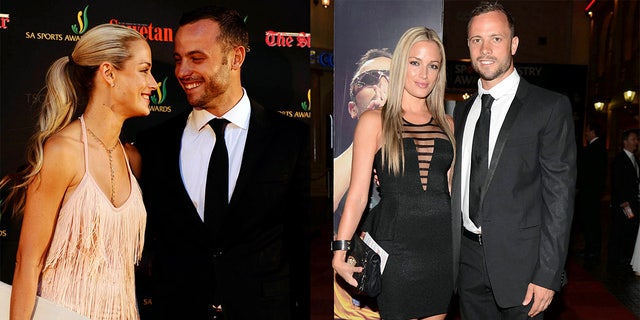
After the state called 21 witnesses, Pistorius took the stand for five days, apologizing to the victim’s parents, June and Barry Steenkamp, and insisting that the tragedy was a terrible accident.
“I wake up every morning and you’re the first people I think of, the first people I pray for,” he said. “I can’t imagine the pain and the sorrow and the emptiness I’ve caused you and your family. I was simply trying to protect Reeva.”
He claimed he had awoken in the middle of the night and heard a sound that he thought was a burglar, who had climbed in through a bathroom window.

“I heard a noise from inside the toilet,” he said of the enclosed stall. “Before I knew it, I had fired four shots.” The bullets struck Steenkamp in the hip, head and hand.
He rushed back to his bed and realized that Steenkamp wasn’t there. He put on his prosthetics, returned to the toilet stall and used a cricket bat to smash open the locked door.
Without his prosthetics, Pistorius said he felt vulnerable and slept with a gun under his bed. Violent home invasions are common in the country, which has one of the highest murder and crime rates in the world.
Pistorius’ story doesn’t add up, prosecutors say
Prosecutors argued that the bullet holes in the door and Steenkamp’s wounds contradicted his claims.
The downward angle of the shots through the door indicated that Pistorius was wearing his prosthetics when he fired. Steenkamp was crouching on the floor with her hands over her head behind the bathroom stall’s locked door when three bullets struck her.
The defensive position suggested that she was not caught by surprise but was hiding in fear, according to lead prosecutor Gerrie Nel.
A neighbor testified that she heard a woman’s “blood-curdling” high-pitched screams before the shots went off, and other witnesses said they had heard the couple fighting earlier in the night.
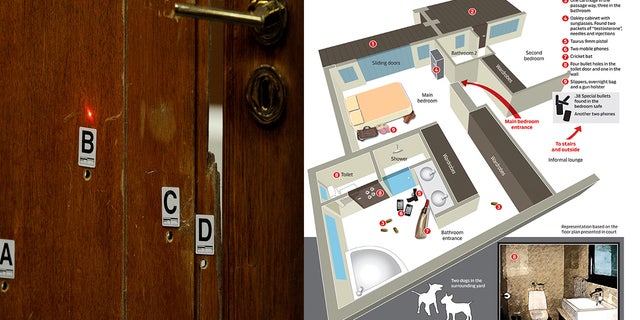
Prosecutors read a text Steenkamp had sent to Pistorius about two weeks before her murder. “I’m scared of u sometimes and how u snap at me and how u will react to me,” she wrote.
Cape Town defense lawyer William Booth, who has been practicing for 27 years, told Fox News Digital that the case hinged on whether Pistorius’ testimony matched the forensic evidence at the scene — and the public perception was that it had not.
“The main problem was the story about an intruder,” Booth said. “He wasn’t truthful. If he had told the truth from the beginning and admitted that he got angry and lost his temper, he may have been better off with a plea bargain.”
Pistorius and Steenkamp had no known history of domestic violence during their three-month courtship, and none of his ex-girlfriends had accused him of physical abuse.
Pistorius is acquitted then convicted of murder
Although Judge Thokozile Masipa said she found Pistorius’ testimony inconsistent and contradictory, she acquitted him of murder. She found him guilty of culpable homicide, a charge similar to manslaughter in the U.S.
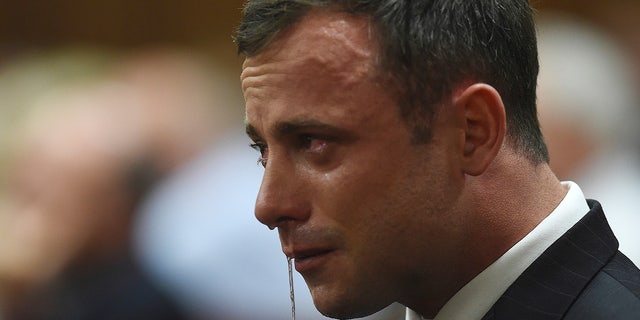
She sentenced him to five years in prison in a ruling that outraged Steenkamp’s parents who said Pistorius had not told the truth about what happened that night. But the saga was far from over.
Prosecutors appealed and, in 2015, the Supreme Court of Appeal upgraded the conviction from culpable homicide to murder, which carries a minimum sentence of 15 years.
One of the judges compared the Olympian’s life to a Shakespearean tragedy when he read the new verdict.
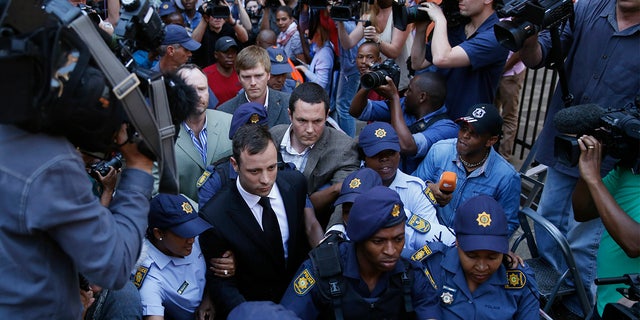
The case was kicked back to Masipa who sentenced him to six years in prison in 2016 after a lengthy hearing.
In a written decision obtained by Fox News Digital, Masipa credited Pistorius’ claim that he felt vulnerable because he wasn’t wearing his prosthetics at the time of the shooting.
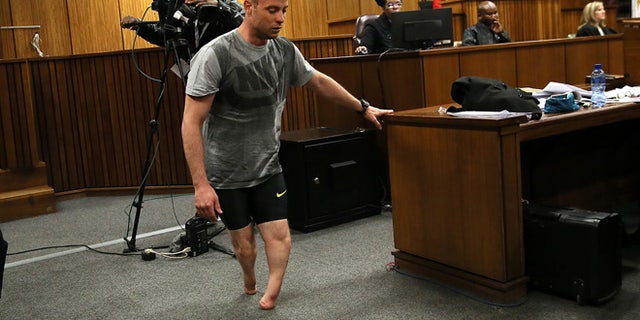
She also rejected the prosecution’s assertion that the couple had a vicious row before the murder, calling it speculation and a “misperception.”
The judge said that Pistorius’ life was forever changed by the impulsive act. “He is a fallen hero, he has lost his career and is ruined financially,” she wrote. Masipa described him as a broken man that was clearly remorseful.
But South Africa’s Supreme Court of Appeal ruled unanimously in 2017 that Masipa’s sentence was far too lenient and imposed a term of 13 years and five months.
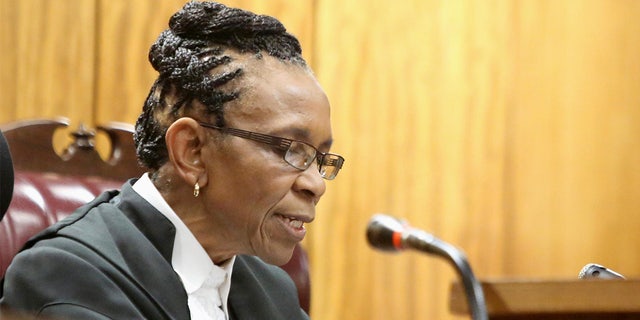
The reversals were highly unusual, Booth told Fox News Digital.
“It happened in this case because of the extensive media coverage,” he added. “The trial was televised internationally and also on pretty much every radio station in the world, as well as in most newspapers. There was a lot of pressure.”
The Blade Runner meets with slain girlfriend’s father
Under South African law, offenders who commit violent crimes are eligible for parole after serving half their sentences — a milestone Pistorius reached in July 2021.
But Pistorius had to first meet with Steenkamp’s parents as part of the parole application process, which is known as victim-offender dialogue.
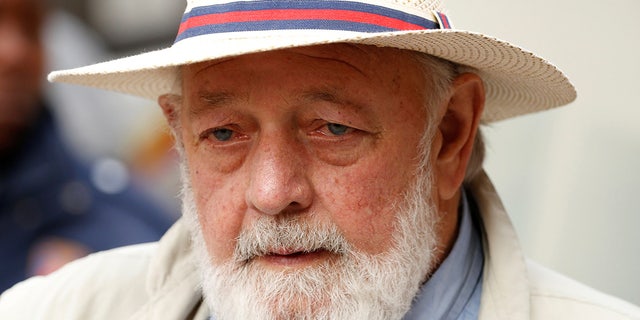
The program gives victims or their relatives a chance to meet with offenders, if they choose to, as part of the healing process.
Pistorius had to be transferred from a prison in Pretoria to a facility near Steenkamp’s childhood home in Port Elizabeth, where her parents still live.
Steenkamp’s father, Barry Steenkamp, who said for years he wanted to meet with Pistorius man-to-man, finally had the opportunity on June 22. His wife, June Steenkamp, did not participate.

The parents’ lawyer, Tania Koen, who was present for the meeting, would not disclose specifics but said it was “good for both parties.”
“It is a very sensitive and private matter, and now [Barry] needs time to process,” Koen told local newspaper HeraldLive. “Nobody in that room could not have been affected.”
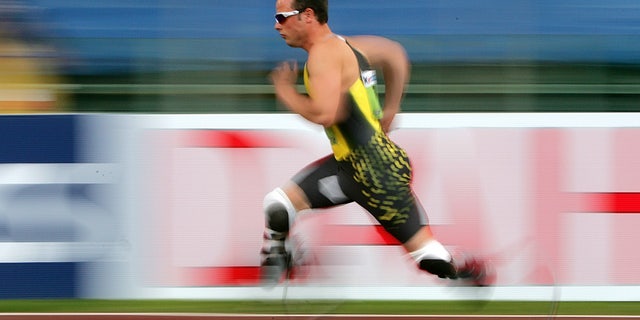
Pistorius must still attend a parole hearing where department of corrections officials will determine whether he will be released early — a decision that could come before the year is out.
The once revered gold-medal-winning athlete now faces an uncertain future.
“He certainly can’t compete again, that is gone,” said Booth. “That, I suppose, is part of the punishment.
The Associated Press contributed to this report.
Read the full article Here


